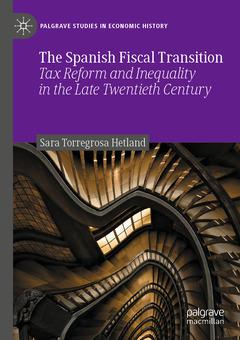Description
The Spanish Fiscal Transition, 1st ed. 2021
Tax Reform and Inequality in the Late Twentieth Century
Palgrave Studies in Economic History Series
Author: Torregrosa Hetland Sara
Language: English
Subjects for The Spanish Fiscal Transition:
Keywords
Spanish tax reform; Spanish economic history; History of finance; Inequality in Spain; Spanish fiscal transition; History of taxation; Spanish economic growth; Spanish stagnation; Late Francoism; Spanish GDP; Spanish economic governance; The political economy of tax; Progressive income tax; Welfare state development; Fiscal sociology; Fiscal reform in Spain
Publication date: 09-2022
237 p. · 14.8x21 cm · Paperback
Publication date: 09-2021
237 p. · 14.8x21 cm · Hardback
Description
/li>Contents
/li>Biography
/li>Comment
/li>
This book provides an analysis of the process and outcomes of the tax reform, with a focus on progressivity, redistribution, and inequality. Between 1977 and 1986, Spain underwent a comprehensive tax reform which shaped its fiscal system until today. It was made in connection with the transition to democracy and indeed was understood as a fundamental part of the political change. The book situates the reform both within Spanish history and international trends in tax systems and connects it to the expansion of the welfare state and regional decentralization in Spain. The analysis reveals that the tax system failed to attain progressivity, and significant levels of fraud had a noticeable impact on inequality. Because of this, fiscal redistribution remained limited. In the new political economy of the second globalization, late democratic and fiscal transitioners were unable to emulate the path of the welfare state forerunners.
Sara Torregrosa Hetland is a researcher and lecturer at the Department of Economic History in Lund University, Sweden. She previously obtained a Degree in History from the University of Alicante and completed her Ph.D. in Economic History at the University of Barcelona (2016). Her main areas of work are the history of taxation, inequality, and public policies, in Western Europe and Latin America, from the late 19th century to the present.




